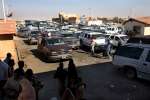- Text size
 |
|  |
|  |
| 
- Français
Unaccompanied children look toward school after ordeal to reach Europe
News Stories, 22 August 2012
BRUSSELS, Belgium, 21 August (UNHCR) – After traveling from Afghanistan inside a container where other children died, being apprehended by police on arrival in Belgium and spending a tedious summer sharing a shabby hotel room with other young asylum seekers, 15-year-old Faramaz* is anxiously awaiting the start of school.
This will be the first time in his life that Faramaz will attend school; he is ashamed that he cannot read or write like other children of his age. It will also replace the boredom of staying in the hotel, where many unaccompanied minors seeking asylum are now housed because other centres have overflowed.
The number of unaccompanied minors who filed for asylum in Belgium rose to 1483 last year, almost double the 2010 figure. Most are boys from Afghanistan, where family members, fearing for the safety or wellbeing of the child, often take on huge debts to arrange travel to Europe with smugglers or traffickers.
"I could hardly breathe and we had to crouch because there was not enough space to stand up," said Faramaz. "I was smuggled from Afghanistan into Europe in a truck together with 17 other youngsters. It was horrible. Three of us died in this container."
Faramaz's story is not an isolated one. According to UNHCR's latest Global Trends 2011 report, globally some 17,700 asylum applications last year were lodged by unaccompanied children in 69 countries. These numbers do not paint the full picture since it can be assumed many more unaccompanied children live in Europe.
According to the latest UNHCR figures, in Europe, Belgium, Sweden, Germany and the UK received the largest numbers of asylum claims by unaccompanied children. Faramaz is one of the more than 100 children for whom there are not enough places in asylum centres in Belgium suitable for unaccompanied children. Efforts are made to remedy this but in the meantime the children stay in hotels.
"We appreciate the efforts Belgium makes in providing for specially trained staff and accommodation for child asylum seekers and we really hope that solutions are quickly found to avoid putting some children in hotels until a place in a centre frees up," said Paolo Artini, UNHCR Deputy Regional Representative for Western Europe.
Faramaz and his friend Mehran* – another unaccompanied youngster from Afghanistan – both arrived in Belgium on their own. They did not know anything about Belgium. After a long and dangerous trip, smugglers dropped them off and both were arrested almost immediately.
The boys laugh sheepishly when asked about their asylum claim. They do not seem to have understood the information they were given or what will happen to them next. "I hear we will have to undergo an age test", Faramaz laughs nervously.
In the absence of parents, children need legal guardians. However, in Belgium there is a shortage of guardians and especially the youngsters in hotels seem to have difficulties getting one. Staying in a hotel is no holiday for the unaccompanied children. They are run-down places where several youngsters share a room.
"There's nothing to do for the children. Boredom is a big problem," says Klaartje Ory, who is with the Flemish Community Commission, the local representative of the Flemish authorities in the Brussels-Capital Region. Klaartje and her colleagues take the unaccompanied from their Brussels hotels about three times a week for an activity.
Since April 2012 the asylum centre of Overpelt has been offering additional places for unaccompanied children between the ages of 8 and 14 years. Mirzal*, a 13-year-old boy from Afghanistan had been moved from a hotel to the centre only days ago.
"Life has become better for me," he said in a barely audible voice. "At the hotel we slept with four other boys in one hotel room. We did not have enough money to buy decent food so we ate beans every day."
Mirzal's father was killed by the Taleban and his mother, younger brother and sister still live in Afghanistan. "I have not been able to speak to them ever since I left Afghanistan – which is now three months ago. I had one phone number for them but the smugglers took it away from me." The death of his father left Mirzal as the eldest male of his family and at the age of 13 he is responsible for them.
"When they arrive, the children often have nightmares, have trouble sleeping or they want to keep wearing the clothes in which they arrived for days on end. For some of them it is literally the only thing they have got left," says Arlette Meuwis, manager of the centre in Overpelt.
* Names changed for protection reasons









































